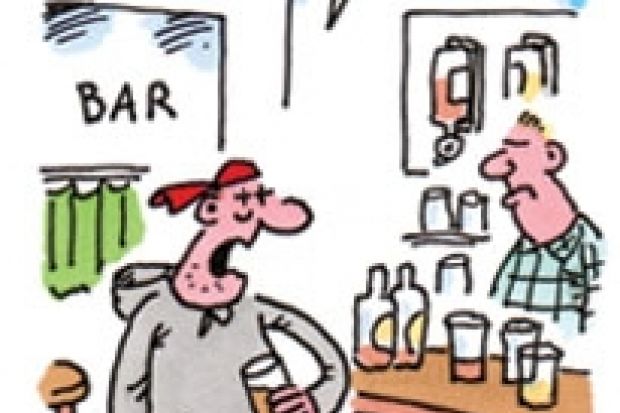American students who study abroad are likely to increase or even double their intake of alcohol while they are away, according to a study. Europe's laissez-faire attitude to drink is well documented, but until now less has been known about whether students from the US "go native" while studying abroad. Research at the University of Washington, reported on 12 October, has concluded that it is common for them "to make drinking part of their cultural immersion". Eric Pedersen, who led the study, said: "In general, drinking is an issue on campus. When you take that and put it in a foreign country, there's potential for more consequences."
The radical proposals in Lord Browne's review of higher education funding hogged the headlines, with the former head of BP giving a series of interviews to explain its findings. Among them was a web chat on the Student Room website that, in light of the plan to scrap the fees cap, should have been a tough gig. It did not pan out entirely as expected. Among the offerings on 13 October were: "If you were an ice cream, what flavour would you be?" (Vanilla), and "Hello, I think your (sic) a legend solely because your a lord." However, not all the interaction was as inane. One student suggested that abandoning the arts and humanities was short-sighted. Lord Browne replied: "We're not. If students choose to study these courses, then the government will provide the up-front funding. If it is strategically important, then it will receive additional funding." Alas, he did not indicate whether his definition of "strategically important" matched that of scholars in the fields.
Academics at the University of Cambridge have been told that they can only appoint external examiners for PhDs who are permitted to work in the UK, a scholar has revealed. Writing on 14 October, Mary Beard, professor of Classics, says this means that many exceptional scholars from overseas will be ruled out. "So what are our options? One idea is that we do it all by video link; another is that we fly the candidate and the external examiner to the US or Australia or wherever. Or maybe we just use the Channel Islands," Professor Beard says. "The idea that the best students in Cambridge should not be examined by the best and most appropriate scholars in the world must make mockery of our claim to be one of the top universities on the planet."
Speaking before the publication this week of the Comprehensive Spending Review, Sir Leszek Borysiewicz, the new vice-chancellor of the University of Cambridge, insisted he would not join in the "shroud waving" of his peers. But just weeks after he described the funding crisis as "a short-term hiccup" rather than the "valley of death" invoked by Universities UK president Steve Smith, reports suggest that Cambridge may be considering a drastic response to the cuts. Barry Sheerman, Labour MP and former chairman of the House of Commons Education Select Committee, said on 17 October: "I was told by Cambridge they may privatise themselves because they are so aggrieved by the cuts and by Lord Browne's proposals." Cambridge stuck to Sir Leszek's earlier line, dismissing the claims as "pure speculation".
Lord Browne's review has been subject to countless interpretations, but only one has attributed his less-palatable recommendations to a snub from a professor 40 years ago. Writing on 17 October, Observer columnist Catherine Bennett points to an incident recounted in Lord Browne's autobiography and dating from his student days at Cambridge. Eminent physicist Brian Pippard, one of his tutors, stopped Browne in a corridor and told his colleague that the promising undergraduate wanted to become a captain of industry. "Isn't that amusing," Professor Pippard is reported to have said. Lord Browne cites the incident as evidence of the "firm prejudice" at Cambridge against business, which is seen as a "waste of potential" for high-flyers. Ms Bennett suggests that, following this "humiliation", Browne has been "waiting 40 years to retort to academics: 'You're stuffed; isn't that amusing'."
Register to continue
Why register?
- Registration is free and only takes a moment
- Once registered, you can read 3 articles a month
- Sign up for our newsletter
Subscribe
Or subscribe for unlimited access to:
- Unlimited access to news, views, insights & reviews
- Digital editions
- Digital access to THE’s university and college rankings analysis
Already registered or a current subscriber?
